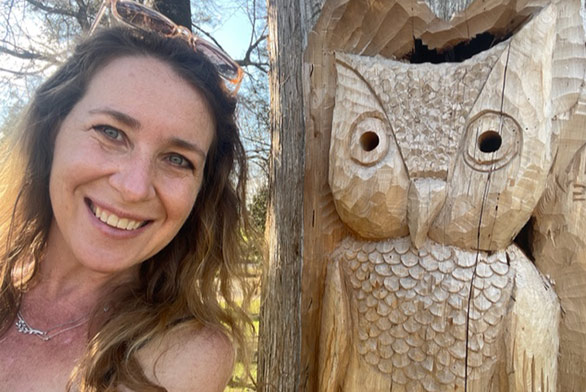Shannon Wiltsey Stirman (SF97): Using Socratic Dialogue in Psychology
June 15, 2022 | By Eve Tolpa

For Shannon Wiltsey Stirman (SF97), the approach to critical thinking she honed as a Johnnie isn’t just an academic skill. It’s also a concrete tool she uses in her work to help people who are suffering. Stirman is an Associate Professor of Psychiatry and Behavioral Sciences at Stanford and a post-traumatic stress disorder (PTSD) specialist who earned a PhD in Clinical Psychology from the University of Pennsylvania. “I was interested in psychology when I went to St. John’s, but I ended up gravitating to a type of therapy that uses the socratic method as a kind of cornerstone,” she says.
In the two-plus decades since her time as an undergraduate, Sitrman has seen a growing awareness of PTSD in the general population, especially in recent years. “There have been a number of things that have happened in the world that have been traumatic,” she says. “Sometimes we talk about big-t trauma—witnessing or experiencing something life-threatening or physically harmful—but there are also these things that don’t meet the criteria for trauma in strict terms. We’re seeing more of both.”
The symptoms of PTSD aren’t something that only a select group of people experience. They are, in fact, says Stirman, a common reaction to trauma. “People need to process trauma, and that takes time. So for a while after, they might be a little more on guard or reactive, or they might be upset or distracted by the memories of what happened. It’s a natural reaction.” That reaction can become difficult when it solidifies into a fixed state. “People get stuck there for a variety of reasons,” Stirman says. “Maybe they don’t have social support or they don’t have a way to talk it through and process the feelings that are natural reactions to trauma.”
Other times, she continues, the feeling of being stuck is the result of well-meaning but outdated messages about life: “For example, when you’re a kid you [are told] that if you follow the rules, you’ll be ok. But the reality is that the world is more complicated than that. Despite your best efforts, something bad happens.” Those who experience trauma often ask themselves how they could have prevented it. “They get stuck with the idea of: If I’d only done this. Or: I should have known better,” Stirman says. “There are all these messages that keep playing out for them, and then they have a feeling of guilt or shame.”
That’s where the Socratic method comes in. “Part of what we do is help them see that what was going on at the time was really complicated, and there were many factors at play, and they might have been doing everything they could in that moment.”
“We can help people strip away some of these assumptions and things they’ve been telling themselves about why it happened, and help them accept what happened. Then they can go through the emotional processing, and they start to feel lighter,” she continues. “That’s part of what the Socratic dialogue is intended to do: help people take a look at what they are saying to themselves about why the trauma happened and what it means to them and what it means about them,” says Stirman.
She is currently finishing up a two-month sabbatical from Stanford. In addition to traveling and attending a writers’ retreat, she completed the editing for a book she co-wrote. Tentatively titled Getting Unstuck from PTSD: A Self-Guided Cognitive Processing Therapy Workbook for Trauma Recovery, it is scheduled to be published by Guilford Press in fall 2022. Stirman and her colleagues also developed the Pause A Moment website, which provides free tools and skills for people who don’t have access to mental health care—or perhaps just need occasional targeted support. “It’s available for anyone, but was designed with input from healthcare workers around the country,” says Stirman, who notes that the site is being used at Stanford and other hospitals to support healthcare workers who have experienced COVID-related stressors.
Stirman credits St. John’s with giving her valuable reference points for collaborating with others. “I really love working on teams,” she says. “The college prepared me to be able to hear and take feedback and use that enterprise to really improve the work and the ideas.”

